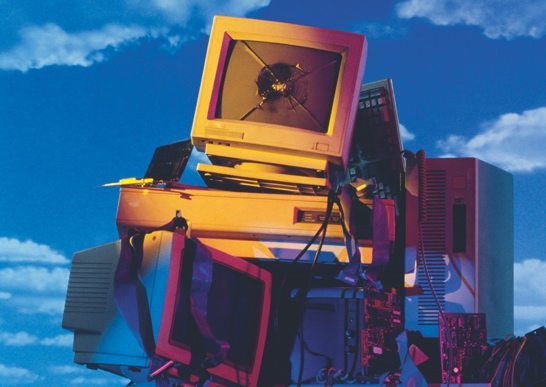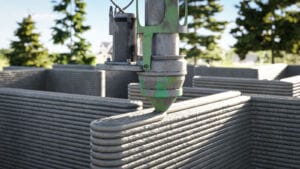It’s time to swap out your old clunker computer for a fast, new one. You discuss your needs with your systems manager, she buys a new machine and makes the swap. Where does that old computer go after it leaves your desk? Do you need to care?
Electronics waste, or e-waste, is getting increasing attention from environmentalists and policy makers around the world. There are a number of reasons why. One is that computers and IT equipment contain heavy metals, in particular lead, which could pose a health concern. While you’re using the computer these metals are safely stuck inside the machine. The concern is that after the computer is disposed of those metals could get out and cause harm.
Policy makers around the world are developing regulations that aim to make sure electronics are designed more safely and are collected and recycled at the end of their usefulness. Europe has a region-wide mandate for both design and recycling of electronics. While there is no federal e-waste recycling law in the U.S., 19 states have mandated systems to collect and recycle electronics. Arizona has yet to enact e-waste legislation, but it would not be surprising if a national law is developed in the next few years.
From the standpoint of complying with current laws, businesses in Arizona need to be aware of U.S. Environmental Protection Agency rules relating to cathode ray tubes (CRTs). Due to their lead content, CRTs are considered hazardous waste, and above a certain threshold there are regulations on how they are to be disposed. There also are rules relating to exporting used CRTs for reuse or recycling.
The notion of corporate social responsibility, increasingly part of business strategy, calls on businesses to move beyond environmental compliance to tackle proactive action so as to “do the right thing.” But what is the right thing to do with e-waste?
It turns out that manufacturing computers and other IT hardware is surprisingly environmentally intensive. For example, if you replace your office desktop computer every four years, the energy to make the computer is about equal to the amount you used while it was plugged into to wall. This means that extending the lifespan of computers can have a big effect on reducing energy use and other environmental impacts by cutting down the number of new computers purchased. Extending lifespan also reduces the amount of e-waste generated.
One way to extend lifespan is to use computers longer. Obviously it doesn’t make sense to sacrifice productivity with sluggish computers, but on the other hand, a new computer doesn’t always mean better job performance. Upgrading CPUs (central processing units) and memory are strategies to squeeze more performance. It’s also important to keep in mind the labor and hassle associated with swapping machines.
Even if a machine is deemed too slow to be appropriate for your firm, there are others who might be able to use it. There are organizations such as AZStrUT, a partnership between local schools and businesses, that accept donations of used computers, and refurbish and provide them to schools and students.
The export of e-waste abroad is an important issue to be aware of, as well. A lot of e-waste in the U.S. gets shipped to China, India and other countries for reuse, which is good. But the e-waste also ends up in backyard recycling, which is bad. In backyard recycling, primitive methods are used to recover materials, processes that cause significant harm to the environment. For example, to recover copper from wires, wires are pulled and piled up and then set on fire to remove the insulation. The emissions from this type of fire are very harmful. While the export of used equipment has the benefit of making IT more accessible abroad, it’s important to export usable equipment instead of junk intended for recycling. Whether your firm sells a computer for reuse, contracts recycling or throws it in the trash, data security also is something to be careful about. Deleting a file doesn’t mean the data is completely wiped from a hard drive; there are tricks people can play to recover the file. You could be shipping your firm’s confidential data right out in the bin. There are special software tools that rewrite over hard drives, so as to destroy all previous stored data.
To sum up, my advice on managing IT hardware in a greener way is:
- Extract maximum use from the equipment while it’s in the firm.
- Donate or sell usable old machines when possible.
- Selling abroad is fine, but make sure it’s usable.
- Contract recycling for junk equipment.
- Finally, before letting a machine leave a business, make sure data is properly erased or that the contractor will do this.




